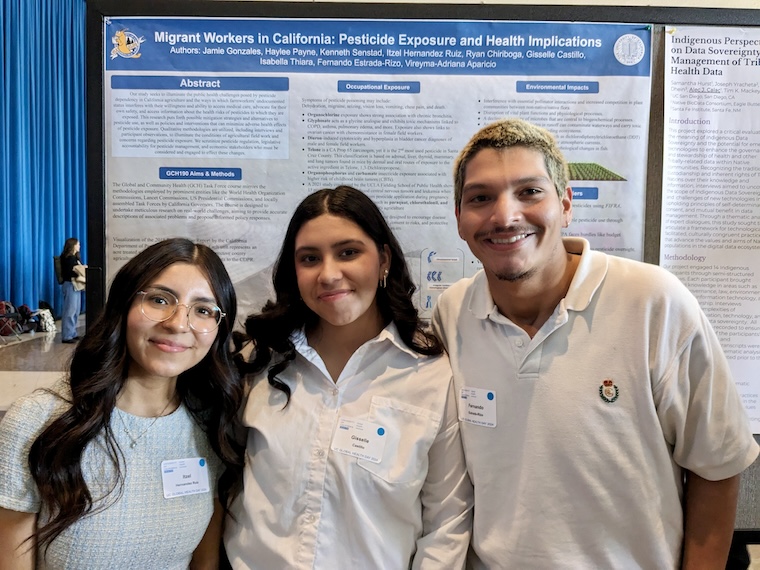Campus News
Equity, civic-mindedness drive UC Santa Cruz’s Global and Community Health Program
Many of UC Santa Cruz’s core values are embodied in the Global and Community Health Program, which draws students who seek to study real-world problems encountered locally and worldwide, preparing them for a career in health care, policy, research or advocacy.

Many of UC Santa Cruz’s core values are embodied in the Global and Community Health Program: a drive for social justice and equity, an interdisciplinary approach, and a focus on one of the biggest challenges we face today – ensuring everyone has access to health care at a time when significant segments of our population avoid providers due to high costs, mistrust, and many other complex reasons.
The GCH program launched in Summer 2022 and began offering B.A. and B.S. degrees that fall, and today, includes faculty across all five of the university’s academic divisions. Program leaders say the goal of advancing health for all is inherently interdisciplinary and encompasses the sciences, social sciences, engineering, humanities, and the arts.
The program draws students who seek to study real-world problems, focus on health needs found locally and worldwide, and prepare for a career in health care, policy, research or advocacy. Hence, the students attracted to GCH are impact-driven and interested in improving lives and reducing health inequities.
Tackling real-world problems
Students currently in the program say they learned about it through the course GCH 190: Global and Community Health Task Force, where they conduct rigorous research on real-world health challenges, ultimately learning to describe the associated problems accurately and recommend responses.
GCH 190 is the new capstone course for UC Santa Cruz’s human biology major and was taught in the Fall 2023 quarter by the program’s co-director, Grant Hartzog, a professor in the Molecular, Cellular, & Developmental Biology Department. That quarter, students grappled with the problem of migrant agricultural workers suffering from exposure to pesticides. Also that fall, a new law went into effect in California that established an environmental justice advisory committee at the state Department of Pesticide Regulation.
Recent statistics from that office report that 191 million pounds of pesticides was used in California in 2021. Exposure to them has been linked to a wide range of health harms, including cancer, asthma, autism, ADHD, birth defects, and Parkinson’s disease.
“I am majoring in human biology, and so far, most of my classes have been STEM courses. So it was really exciting to get to learn about the social aspects and factors that affect people and medicine,” said student Gisselle Castillo (Oakes ‘25, human biology). “I was learning so much about how it was affecting the farm-working community, which was why this course hit so close to home.”
Inspired by peers and role models
In addition to bringing real-time challenges into the classroom, the program takes students out into the world to share what they’ve learned and engage with the broader global-health community. Nine of the students in last fall’s class traveled to UCLA on March 7 to attend UC Global Health Day, an event that showcases global-health research, training, education, and advocacy taking place across the University of California system and beyond.
This year’s theme was “Making Change: Creating Health Equity Through Policy and Advocacy” and drew nearly 500 attendees. The California Department of Health’s chief equity officer, Rohan Radhakrishna, was the opening plenary speaker. GCH-affiliated faculty member Carlos Martinez, an assistant professor in UC Santa Cruz’s Latin American & Latino Studies Department, spoke on a panel about environmental justice.
“UC Global Health Day really locked me into what I want to do with my future. I was so inspired by all of the talks and meeting so many people doing this research,” said Jamie Gonzales (College Nine ‘24, global and community health). “It’s also true that global health has so much doomism. But this event brings so many people together to inspire hope.”
An interdisciplinary challenge and response
Indeed, UC Santa Cruz’s Global and Community Health Program was born in the wake of a pandemic that forever changed the world and put public-health leaders and agencies like the Centers for Disease Control and Prevention under intense strain and scrutiny – if not outright hostility rooted in some people’s ideological or political beliefs. COVID-19 also made clear how the rapid spread of misinformation online only amplifies public uncertainty during an emerging health crisis.
“That’s part of the context we’re responding to,” said Heather Gardner, managing director of the GCH program. She added that last week’s event showed how inclusive the broader public-health community is, which aligns with the program’s openness to students with diverging career objectives.
“Our goal is to prepare our students so that they are trained in a way that is holistic enough to meet the needs of their career pathway, coupled with a critical understanding that health is anchored in social determinants like housing and issues of racism,” Gardner said. “Health equity is at the center of the program.”
UC Global Health Day is the signature conference of the University of California Global Health Institute and was held at UC Santa Cruz in 2022. That year’s theme was “Centering Social Justice in Community Health.”